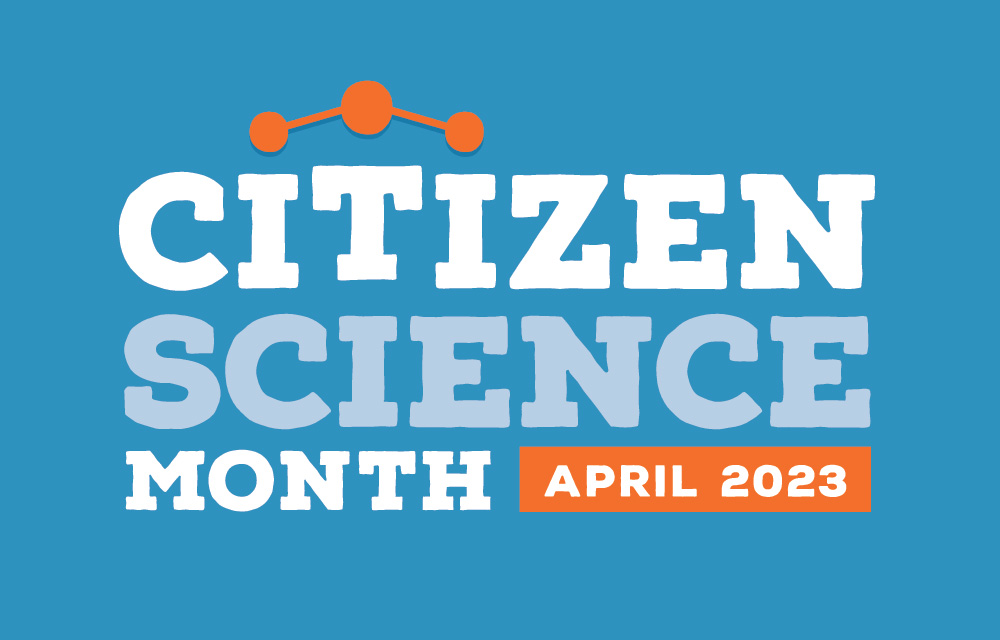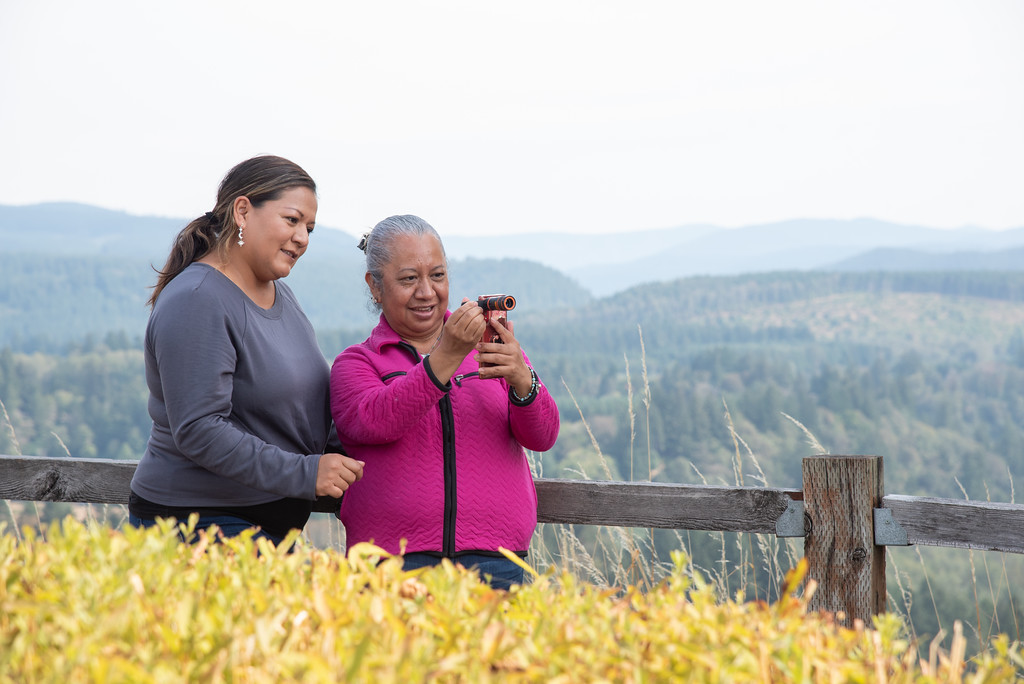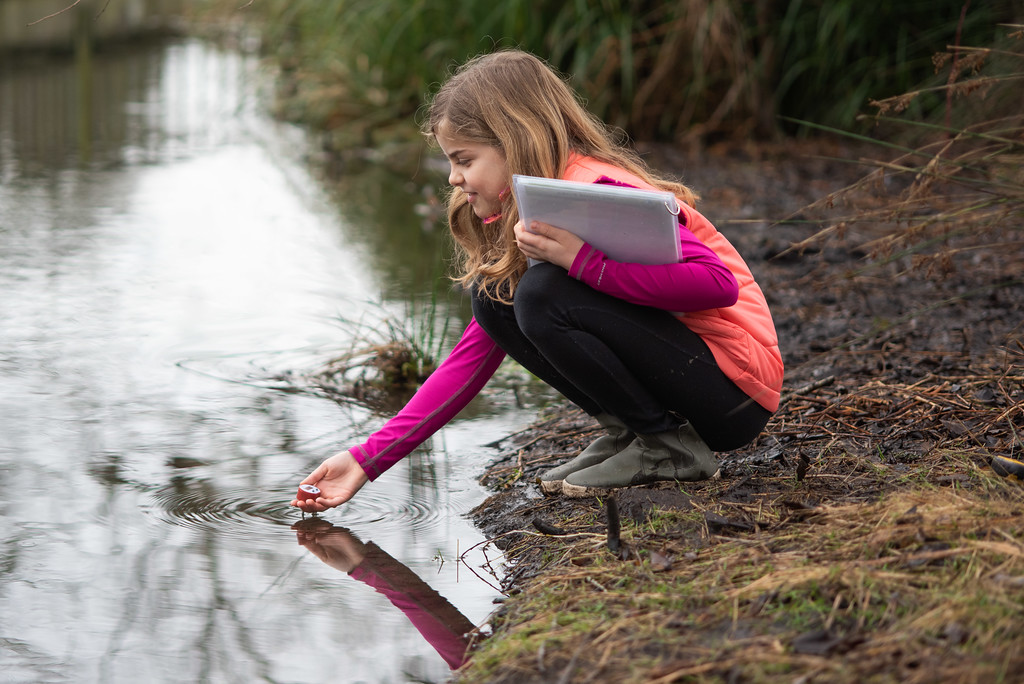
Whether you’re brand new to citizen science or a seasoned enthusiast, April is the perfect time to get involved with citizen science initiatives! All month long we’re celebrating Citizen Science Month, which brings together researchers, facilitators and people like you to explore the ways collaboration can make a monumental impact on scientific research.
Together with Arizona State University and support from the National Library of Medicine, SciStarter is hosting Citizen Science Month for the eighth year in a row. At citizensciencemonth.org, you can browse the Event Calendar, which is packed full of free citizen science opportunities that you can join in person and online!
Of course, you can do citizen science all year long. But Citizen Science Month is important because it helps amplify the collective impact that citizen scientists have on furthering research. During April, many people try out citizen science for the first time, or come together with their friends, families and organizations to participate in projects as a group. The power of citizen science is in the numbers; more participation means more progress!
Educators, families, students, and curious people all around the globe – like you! – are invited to join in the fun this month. Citizen Science Month is packed with events that help get you outside and into your community, as well as events you can do online right from home.
Get Outside with Citizen Science in Your Community
As spring blooms, April is a great time to get outside again. Citizen Science Month has numerous opportunities to explore citizen science in your own neighborhood, whether with public events or projects that you can do right near your home.
If you live near Washington, D.C. you can learn how to become an urban naturalist with an April 8 event at the Georgetown Neighborhood Library. See how anyone can observe nature in their own backyards and learn how to tune your senses to the natural world. Practice submitting your observations to iNaturalist in preparation for the City Nature Challenge (also a Citizen Science Month event), which kicks off April 28.

You don’t always need to go outside to help make a difference for the environment. With Land Pollution Lookout, you can use satellite images of the Niger Delta to identify oil spills to track contamination and highlight the extent of the problem. Find out more about the project at events on April 10 and April 17.
On April 12, librarians can learn how to help their communities prepare for not one, but two upcoming solar eclipses, in 2023 and 2024. The Solar Eclipse Activities for Libraries virtual training series from STAR Net will show you how to incorporate citizen science into your eclipse programming!
Did you know urine is one of the best fertilizers out there? And it’s also free! See how you can turn waste into garden wealth at the online Urine My Garden Community Science Kickoff, April 26. You can take a short survey about your own garden practices and then stick around to ask any questions you might have.
If you’re in the Boston area, check out Rise Up Boston: A Climate Event, a full weekend of activities starting on April 29 at the Boston Museum of Science. Hands-on activities, live presentations, climate conversations and more will introduce you to people addressing climate change, and show how you can make a difference too.
Find More Great Citizen Science Month Events
Help Improve Healthcare at the All of Us Event
Imagine a future where healthcare is personalized to meet everyone’s needs. The All of Us research project is seeking to recruit a diverse set of volunteers in the United States whose health data will help researchers develop personalized treatments and reshape medicine as we know it.
The All of Us Research Program is a key part of Citizen Science Month. We encourage you to learn more and sign up to join this important effort today, and attend one of our featured All of Us Citizen Science Month events.
For one of these events, on April 10, All of Us California is hosting the Cross-Generational Perspectives on Medical Research event, which will feature four scientists and medical professionals discussing the hurdles they’ve overcome and sharing insights from throughout their careers. This event is ideal for students just starting out in science and medicine, professionals looking to advance their careers, and anyone interested in how medical research works behind the scenes.
You don’t have to be in California to join! The webinar will be streamed online and free for all to watch at 6 PM Eastern Time. Make sure to RSVP in advance at this link.
Science Friday’s Earth Day, Every Day Webinar
Looking for some exciting activities for young citizen scientists on Earth Day (and beyond)? Science Friday and SciStarter have just the session for you on April 13!
Hosts will introduce you to a variety of environment-focused projects to get you outside and into nature. They’ll show you how to use NASA’s GLOBE Observer: Trees app to record tree observations in your local ecosystems, and National Geographic’s Marine Debris Tracker to log litter in your area and better understand the plastic pollution crisis.
Apps like these can be used anywhere and offer a fantastic learning opportunity for curious, young students. This free, virtual session is ideal for teachers, after-school educators, and caretakers looking for new hands-on activities to get kids outside!
Tune in at 8 PM Eastern Time to learn more.

Join a Spanish-language event with GLOBE Observer: Clouds and All of Us
There are a number of Spanish-language resources to support Citizen Science Month activities, and even a few events in Spanish! This event on April 23 at 2 PM Eastern Time – held in honor of the United Nations’ Spanish Language Day (el Día del Idioma) features speakers from NASA’s GLOBE Observer: Clouds (a project that invites participants to help NASA monitor the sky from above and below) and the All of Us research program.
Stop the Next Outbreak! Webinar with Outbreaks Near Me
We may never live in a world without the flu or Covid-19, but people like you can help stop the spread of these viruses early. The Boston Children’s Hospital project Outbreaks Near Me relies on a network of citizen scientists who anonymously share daily health data in order to help researchers track the early warning signs of disease outbreaks.
On April 24, hosts from the Outbreaks Near Me project will show you how you can get involved! The informative session is open to everyone at 6 PM Eastern Time, though participation in the project is especially aimed at teens and adults. Make sure to register for free here.
Science Friday Webinar: Bring Citizen Science Home All Year Round!
Even when Citizen Science Month ends, there will be plenty of opportunities to keep participating! Citizen science can be done from virtually anywhere and by anyone, anytime – as long as you know where to find projects and resources.
On April 27, Science Friday and SciStarter will share tips for educators and families on how citizen science can be a part of your life year-round. They’ll introduce you to specific initiatives like Project Squirrel and Floating Forests, which encourage you to get outdoors and engage with nature right in your own backyard. This fun discussion will show you that citizen science can be a casual, everyday task that’s engaging for everyone.
You can tune in at 8 PM Eastern Time, and registration is free.
And don’t forget that you can check out Citizen Science Month opportunities on SciStarter all month long! There’s something for everyone to enjoy – from in-person fairs to online trainings to activity kits you can pick up at your local library. Enjoy the citizen science celebration!
This SciStarter project is supported by the National Library of Medicine, National Institutes of Health, Department of Health and Human Services, under Cooperative Agreement Number U24LM014070 with the University of Pittsburgh, Health Sciences Library System and the University of Iowa, Hardin Library for the Health Sciences.

